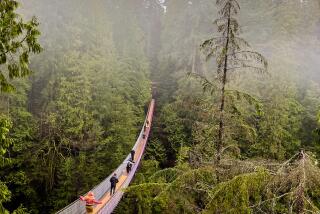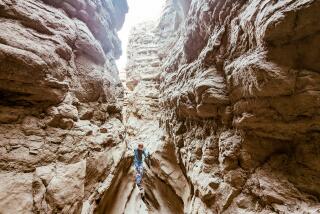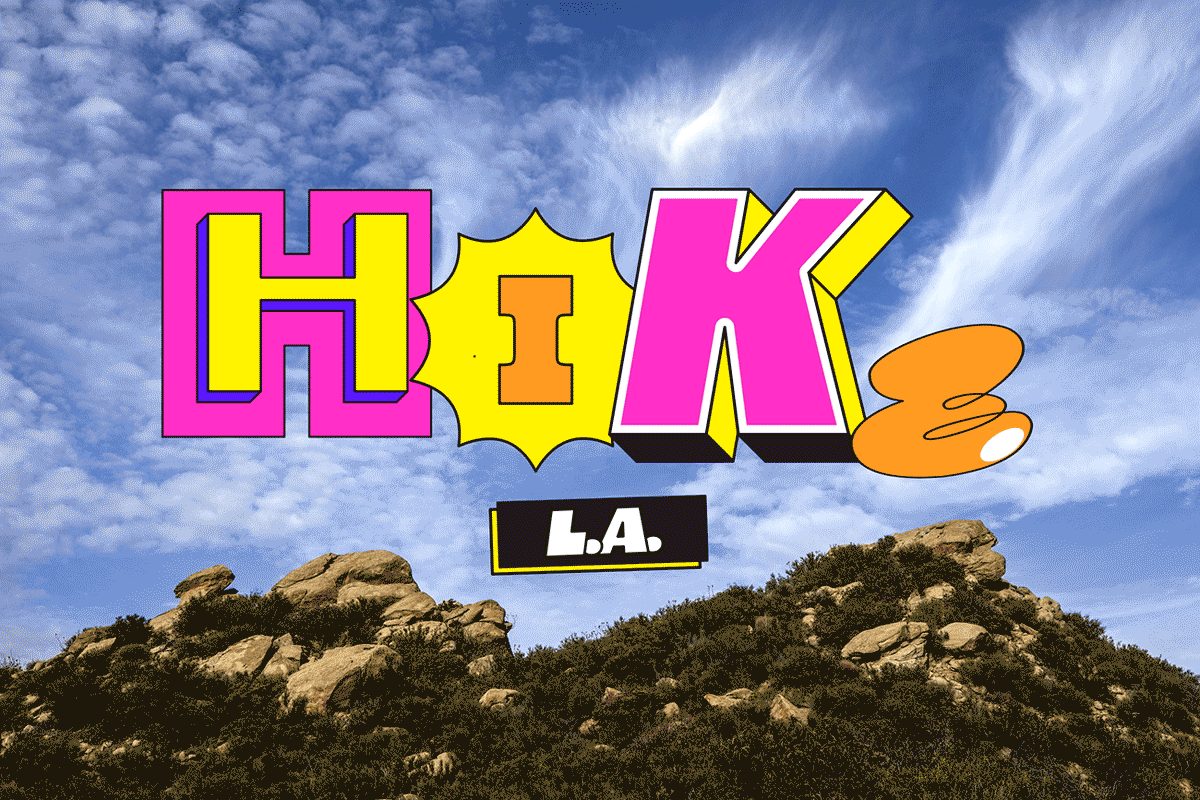Taking a Hike Up the Peak Is One Way to See Jamaica’s Blue Mountains
- Share via
KINGSTON, Jamaica — “De mist, she sleep down by de sea; soon be up,” says Leonard (Baps) Cole, a lean, 55-year-old Jamaican and guide to the Blue Mountains.
We have just reached “The Peak,” as it is known to all Jamaicans--Blue Mountain Peak, the highest point in the Caribbean, rising 7,402 feet virtually straight out of the sea. It is dawn.
As the sun clears the horizon, the blue mists that named this range swirl slowly in the humid daybreak, dispersing over the coastal city of Port Antonio, outstanding with its twin harbors.
Later, Baps sights Cuba 90 miles north, a thin land line floating on emeralds.
It was worth getting up at 1:30 a.m. to hike the last 3,000 feet to Blue Mountain Peak, city lights from Kingston glowing in the sky, 10 miles away and 4,200 feet below.
We had to feel the ancient trail through the dark forest, not really see it. At that early hour there was little talking, with Baps leading the way past fern-encrusted slopes and washed-out switchbacks below trickling river heads.
We took it easy, savoring the cool night air, saving energy for celebrating our ascent with mangoes, “bulla” spice cakes and toasts, swigging Jamaican rum at The Peak at sunrise, then planting the mango seeds beside the trail.
We had spent the last four days hiking up and down sparsely populated tropical montane and rare elfin woodland forests.
Prehistoric-looking, machete-toting Jamaican farmers took a little getting used to, but after chatting with some and buying several rounds of beer, preconceptions vanished.
Soon it looked perfectly normal, seeing planters with bananas on their heads, women balancing enormous baskets brimming with scallions or thyme and ragged-clothed or barefoot kids.
When descending from The Peak in daylight, dwarfed elfin woodland thickets of leathery and hairy plants with tiny, delicate pale flowers gave way to impenetrable tree cover on damp sides of the trail.
Changing green shadows rippled across the hillsides, the sun climbing through clouds, with more clouds below us.
Wet multi-textured mosses clung to rocks or tree trunks. Dead trees leaned on live ones, held by enormous vines.
Ferns seemed to float out of the mist, lacy small ones and Kong-size tree ferns beneath 150-foot eucalyptus trees.
All over the Blue Mountains, farmers worked impossibly steep hillside gardens, growing carrots, scallions, yams, onions and thyme for Kingston markets.
Baps masterfully whipped up traditional peas ‘n’ rice, along with fresh steamed carrots and yams spiced by country pepper at our guest house starting point at 1:30 p.m., our 12-hour round trip over.
With shoes removed and tired feet propped on a porch rail, we watched grazing goats.
We had begun days earlier in the foothill village of Jack’s Hill, with Kingston spread out 2,000 feet below. After a night at the hiking center there--in a clean room stocked with maps, magazines and reference books, and welcomed by informative guides and tasty Jamaican cooking--we set out the next morning.
We hiked trails and deserted dirt roads for four to five hours daily, stopping often to swim under a waterfall or drop in village rum shops for a cold beer.
The next two nights I spent as the only guest in comfortable cabins at parks called Hollywell and Clydesdale, both government-operated forest reserves.
The meals featured boiled green bananas, ackee, gunga peas, sweetsop, mangoes, straight-from-the-chicken eggs, Blue Mountain coffee and straight-from-the-bush herb teas.
Hollywell’s marked trails led past orchids, Spanish needle, Asian honeysuckle and Jamaican roses with hanging red flowers.
Songbirds serenaded us and butterflies replaced lowland insects. Compared to crowded, urban Jamaica, mountain people seemed less interested in selling us much of anything. No one hassled us; here, you have to ask.
We met James Dennis, who grows and sells the legendary Blue Mountain coffee at his farm in the village of Section, near Clydesdale.
A pound of Blue Mountain costs $35 U.S., making it one of the world’s costliest coffees. Dennis sells a pound for $35 Jamaican (about $6 U.S.). Is it good? Depends on if you fancy mainlining caffeine.
It is sweet with a kick--very Jamaican. It might make you feel like jogging back to Clydesdale’s little swimming hole for a skinny-dip, like we did, under a canopy of mahoe, eucalyptus, mahogany and Caribbean pines.
Cinchona Botanical Gardens, above Clydesdale at 5,000 feet, featured plants from every continent in an unlikely formal setting on a high-wilderness ridge.
From there it took the better part of the day to hike down to Westphalia, across the Green River to Penlyne Castle and Whitfield Hall. After a late Baps dinner, we got a few hours’ sleep before setting out for The Peak.
-- -- --
Jamaica and the Blue Mountains were spared the devastation of Hurricane Hugo last September. The storm never touched the island. As for the lingering effects of Hurricane Gilbert, which caused untold millions of dollars of damage in September, 1988, the country seems well recovered.
Foliage has grown back, and fruits and vegetables in short supply after the storm are now readily available. Structural damage to homes and businesses have been repaired, and the country looks fresher under the new roofs and coats of paint.
Jamaica is as close to the United States as 90 minutes by air from Miami, making its Blue Mountains one of the most accessible foreign wilderness areas to the North American traveler.
From Los Angeles, the best connections to Jamaica (Montego Bay or Kingston) are via Air Jamaica, the national airline. Round-trip fare from Los Angeles to Kingston ranges from $553 to $605. Call toll-free (800) 523-5585.
Jamaica Shuttle offers round-trip flights between Fort Lauderdale and Montego Bay for $192. Call (800) 526-2422.
For best access to the Blue Mountains, fly into Kingston. The Peak is 10 miles from the city limits.
Kingston, like any city of a million residents, has its share of hustlers, scoundrels and dealers, but it also boasts culturally powerful reggae clubs, vital restaurants and a Bob Marley Museum on Old Hope Road, all set in the largest southernmost English-speaking metropolis in the hemisphere.
It is the hub of Jamaican society--rough, hot and urban. Cool off in steamy Kingston by hiring a boat to the uninhabited harbor cays for snorkeling, sunbathing and surprisingly decent fishing.
The Forestry Dept. cabins at Hollywell, Clydesdale and Blue Mountain Peak are about $5 nightly. Reservations must be made in person at 173 Constant Spring, Kingston.
Camping is allowed, but you have to pay the cabin rental fee. Whitfield Hall, the closest guest house to The Peak, charges about $5 U.S. per person for a room and cooking privileges. A guide will charge you about $15 U.S. daily; you buy his food and pay for his accommodations.
Two people hiking through the Blue Mountains can do it for about $300 each for seven days, including accommodations, meals, guide and ground transportation. Most arrangements are negotiable.
The hike to Blue Mountain Peak takes 3 to 3 1/2 hours for the fit, 4 to 5 hours at an easy stride. You don’t have to be super-fit, but you should enjoy walking. Hiking distances throughout the Blues are short but steep.
You’ll only need sneakers, not hiking boots. Shorts suffice most of the time, long pants and a sweat shirt for nights and the Blue Mountain trail.
Carry a comfortable lightweight pack. An umbrella or rain suit will come in handy for frequent, brief showers, more of which you are likely to encounter in summertime.
A flashlight, sun hat and insect repellent are mandatory, along with a swimsuit. There’s good river swimming in the mountains, and even when you are standing at The Peak, you are only a few hours from a beach.
Make sure you have $80 Jamaican when you get ready to leave the country, for an airport departure tax. That’s double the fee of a year ago.
For Blue Mountain camping and hiking information, contact the Jamaica Camping & Hiking Assn., P.O. Box 216, Kingston 7, Jamaica, West Indies, (809) 927-2097.
For general information on travel to Jamaica, contact the Jamaica Tourist Board, 3440 Wilshire Blvd., Suite 1207, Los Angeles 90010, (213) 384-1123.
More to Read
Sign up for The Wild
We’ll help you find the best places to hike, bike and run, as well as the perfect silent spots for meditation and yoga.
You may occasionally receive promotional content from the Los Angeles Times.






